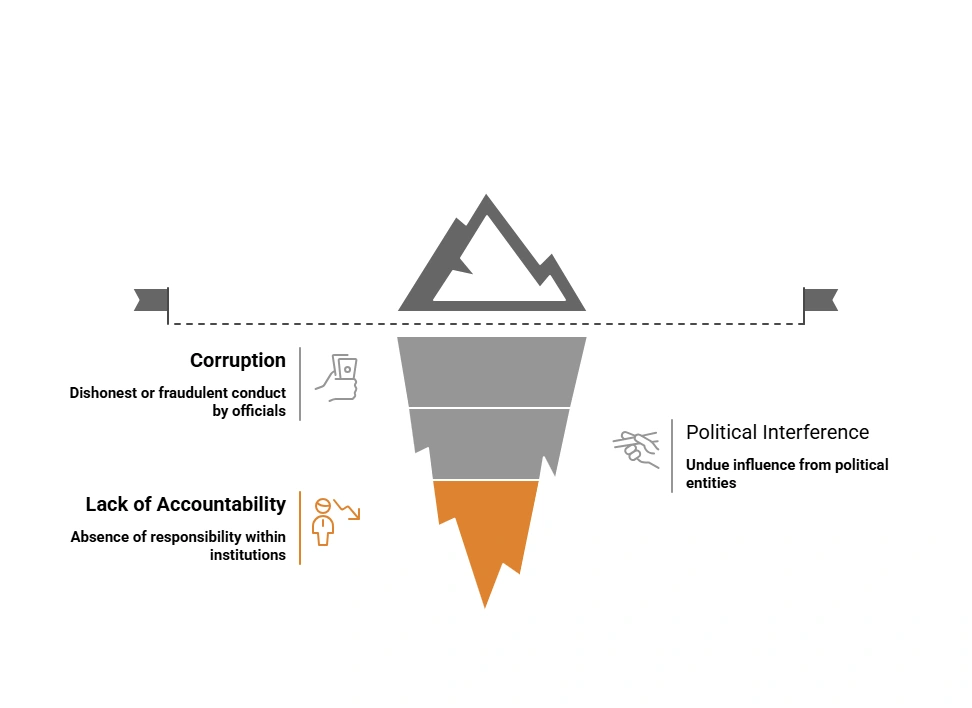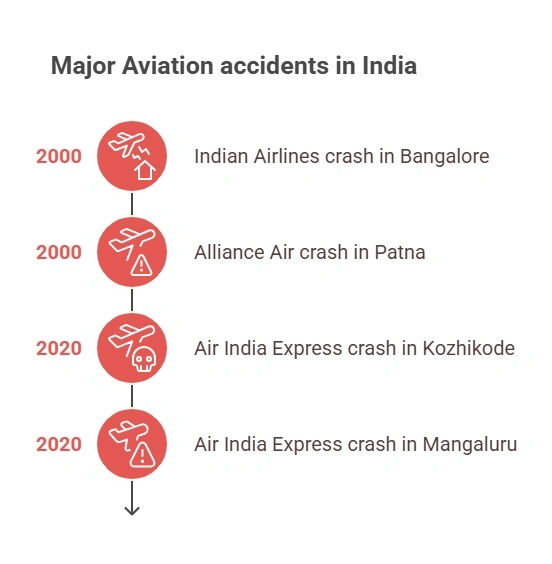Paper: GS – II, Subject: Governance, Topic: Important aspects of Governance, Issue: Issues with India’s aviation sector.
Context:
The crash of Air India flight AI117 at Ahmedabad (June 12, 2025) highlights systemic issues in India’s civil aviation governance, safety oversight, and accountability mechanisms.
Key Highlights:
Civil Aviation governance issues:

Downward Slide in Aviation Safety:

- Lack of accountability: Officials and safety authorities remain unchanged post-crash — no accountability.
- Ineffective response: Ministry of Civil Aviation’s response often focuses on defensive rhetoric rather than actionable reform.
- Institutional Failures: DGCA, MoCA, Airports Authority of India (AAI), and airlines have failed to enforce International Civil Aviation Organization (ICAO) safety norms.
- Negligence: Authorities have shown blindness to crucial safety warnings and regulations.
- Judicial resistance: Weak judicial support for aviation-related Public Interest Litigations (PILs).
- Training and Procedural Gaps: DGCA’s report highlights:
- Pilots involved were not trained in dealing with such emergencies.
- Emergency handling drills and simulator-based training not emphasized.
Scenario of Ahmedabad Crash:
- CCTV footage shows aircraft used full runway length but could not lift off.
- Grass ingestion and bird activity noted. It points to
- Improper take-off configuration,
- Absence of training for handling such scenarios,
- Lack of timely pilot response or warning system.
- Probable Technical Issues:
- Possible partial thrust loss due to bird ingestion.
- Aircraft had a high nose angle, indicating poor lift.
- Digital Flight Data Recorder and Cockpit Voice Recorder expected to clarify further.
Comparative Analysis:
- Global comparison: Lack of technical investigation and response culture in India compared to NTSB (USA), and AAIB (UK).
- These agencies operate independently and transparently, ensuring credibility and lessons learned.
Measures needed:
- Strengthening institutional accountability: MoCA, DGCA, and AAI must be subject to audit and reform.
- Independent Accident Investigation Bureau: Separate from airline and ministry influence for effective regulation.
- Transparent training and certification standards.
- Enforcing ICAO compliance strictly.
Implications:
- Effective governance: Aviation safety is not just a technical issue — it reflects the governance health of a country.
- Aviation standard: Public trust and India’s global image as a safe aviation destination are at stake.
- Reforms must start from the top of the aviation hierarchy.
Conclusion:
The crash is a wake-up call for India’s aviation ecosystem. Without independent oversight, training reform, and true accountability, safety lapses will continue. Systemic corrections are needed — not just pilot blame
La Excellence IAS Academy, the best IAS coaching in Hyderabad, known for delivering quality content and conceptual clarity for UPSC 2025 preparation.
FOLLOW US ON:
◉ Youtube : https://www.youtube.com/@CivilsPrepTeam
◉ Facebook: https://www.facebook.com/LaExcellenceIAS
◉ Instagram: https://www.instagram.com/laexcellenceiasacademy/
GET IN TOUCH:
Contact us at info@laex.in, https://laex.in/contact-us/
or Call us @ +91 9052 29 2929, +91 9052 99 2929, +91 9154 24 2140
OUR BRANCHES:
Head Office: H No: 1-10-225A, Beside AEVA Fertility Center, Ashok Nagar Extension, VV Giri Nagar, Ashok Nagar, Hyderabad, 500020
Madhapur: Flat no: 301, survey no 58-60, Guttala begumpet Madhapur metro pillar : 1524, Rangareddy Hyderabad, Telangana 500081
Bangalore: Plot No: 99, 2nd floor, 80 Feet Road, Beside Poorvika Mobiles, Chandra Layout, Attiguppe, Near Vijaya Nagara, Bengaluru, 560040
